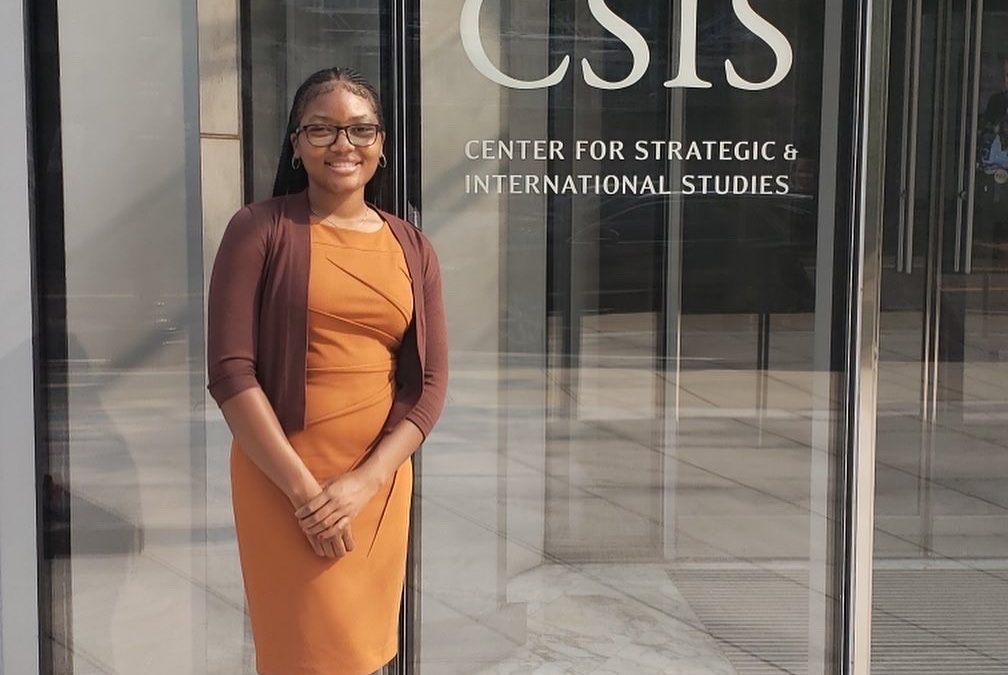
by Mohamed Elshekh | Oct 5, 2021 | Graduate Students, Internship Experiences
My name is Tajah McCray, and I am an M.A. candidate at the School of Diplomacy. In Summer 2021, I was a research intern with the Wadhwani Chair in U.S-India Policy Studies at the Center for Strategic and International Studies (CSIS). CSIS is a think tank based out of Washington D.C. and its purpose is to define the future of national security. The Wadhwani team conducts research on how the United States and India can further enhance their cooperation in areas such as defense and economic development, including promoting business engagement between the United States and India, and the environment.
While pursuing my undergraduate degree in International Relations I went on an International Service-Learning Trip to India. I stayed in India for about a month and visited the states of Andhra Pradesh and Uttar Pradesh. During my time in India, and after I returned to the United States, I knew that I wanted to continue my studies in the field of International Relations and further my knowledge of India and South Asia. That experience led me to the Diplomacy program here at Seton Hall University and the Internship with the Wadhwani Chair in U.S-India Policy Studies.
As a research intern, I had multiple tasks but two tasks that I enjoyed were tracking information regarding the COVID-19 outbreak in India and writing my own blog post to publish with CSIS. I enjoyed the research because it gave me a chance to explore the healthcare system of another state and I was exposed to different challenges India and other emerging states face regarding global health such as the lack of medical supplies and the impacts of vaccine nationalism.
I was given the freedom to write blog posts for CSIS on topics such as U.S-India relations, Indian economic reforms, innovation, and defense. While I was extremely excited about this opportunity it was challenging. The posts must be written in executive style writing which I am familiar with thanks to two classes I took here at Seton Hall which are Comparative Foreign Policy and the Statecraft of Foreign Policy. During these classes, I was tasked with writing an executive summary on U.S-Saudi Arabia relations and U.S-India relations. As a result, I felt prepared to write my blog post.
I would recommend this internship to anyone interested in learning about India or South/Southeast Asia. During my time at CSIS I covered India’s cooperation with China, Japan, Bangladesh, Myanmar, Sri Lanka and more. In addition, I expanded my knowledge on many areas related to international relations such as trade, defense, global health, and international law. I also had the opportunity to network with senior officials who are in careers that I potentially would like to enter such as becoming a Research Fellow in South Asia relations at the Heritage Foundation or entering a career in the civil service through the U.S. State Department. This internship has built my confidence and it truly was a great learning experience.
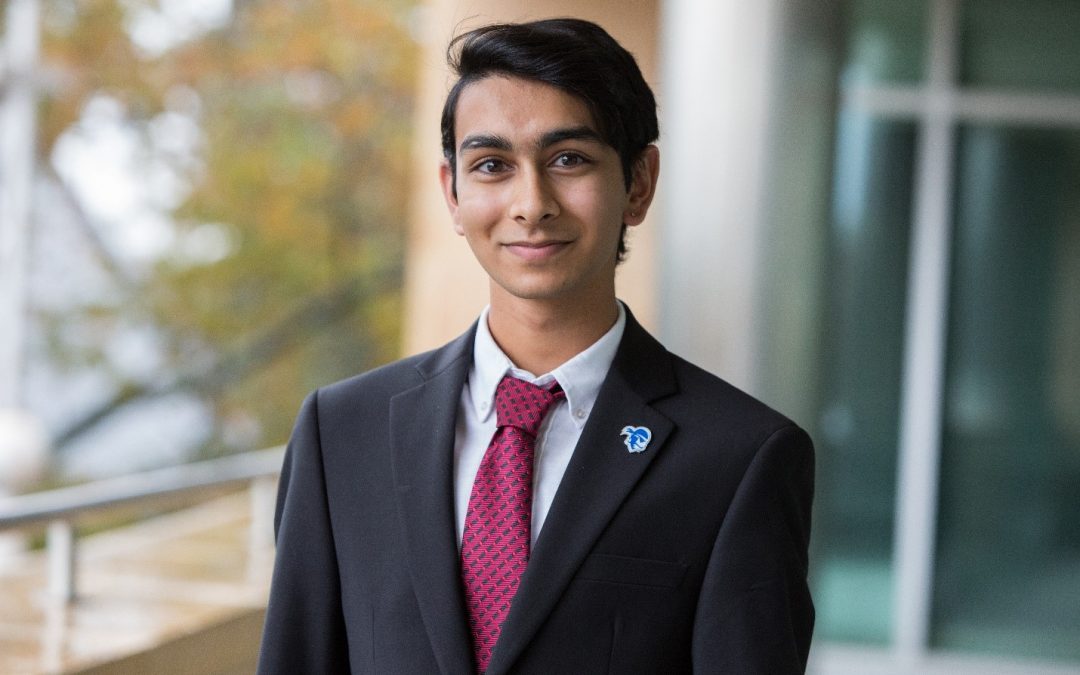
by Mohamed Elshekh | Aug 4, 2021 | Internship Experiences, Undergraduate Students
My name is Keshav Agiwal, and I am a junior at Seton Hall University, double majoring in Diplomacy and International Relations and Philosophy with a minor in Communications. I am currently interning with the Gore Law Office as a client engagement intern. This internship has allowed me to develop a deeper understanding of the court system and the field of family law. While I work with clients and assist them in understanding court procedures, I also research how the law might apply to specific situations.
The skills and concepts I learned in courses like Cross-Cultural Negotiations and Public International Law have prepared me to complete my internship tasks effectively. Cross-Cultural Negotiations focused on simulations that encouraged students to communicate in ways that addressed the needs of all parties involved. In the course, we examined the norms of communication in different ethnic groups and how these differences could impact the effectiveness of communication between states. My internship has provided me with the opportunity to speak with a number of clients from diverse backgrounds and use this foundational knowledge to develop a closer connection with them – in turn allowing me to effectively help them achieve their goals.
Along with communication skills, I believe that strong writing is important in the field of diplomacy and law. Through my Public International Law course, I learned to analyze cases and write concise briefs that furthered my understanding of the law. Similarly, one of the most important skills I practice with Gore Law Office is the ability to write clearly and concisely by including only the most important facts of the case in briefs and memos.
The pandemic has forced many things to be done virtually. Although I am working from home, my supervisor has been working hard to give me the most of this experience. He hosts workshops and training sessions on different topics where I learn about interesting concepts and rules in family law, and skills I will need to succeed in law school. This experience has solidified my decision to pursue a career in the field of law. Though the workload and deadlines can prove to be a challenge, the results, and joy that some clients express at the end of the process keep me motivated to work harder and continue to help others.
I would recommend students interested in law to intern with a law office or attorney because it will give them insights into some of the daily tasks of lawyers. I am fortunate that my supervisor, an attorney, has been very transparent with me. He has taught me several important skills I hope to use as I grow professionally. I hope to keep strong connections with everyone I met at this law office, and I am certain that I will most definitely use the skills I gained through this internship in the future.
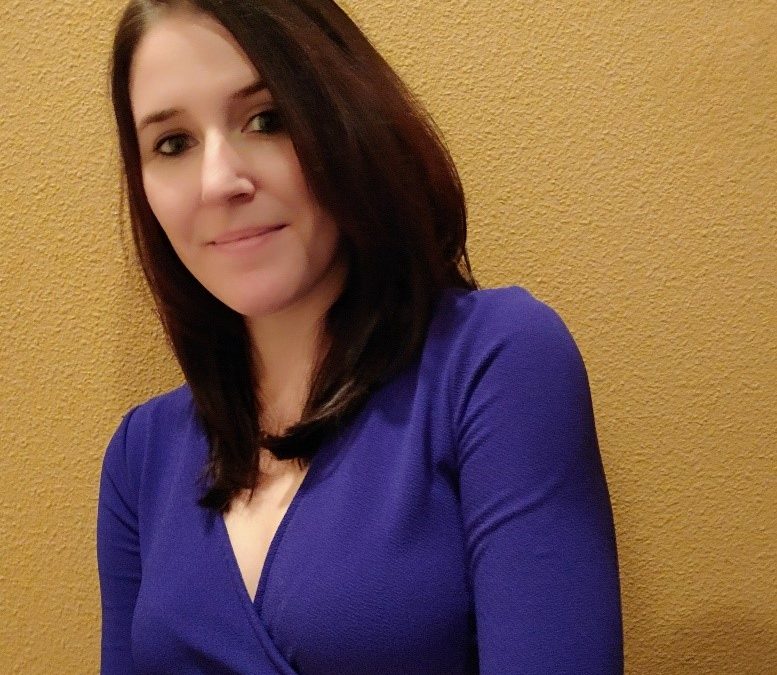
by Mohamed Elshekh | Jun 28, 2021 | Graduate Students, Internship Experiences
My name is Jocelyn Anderson and, I am a graduate student at the Seton Hall University’s School of Diplomacy and International Relations specializing in Global Negotiation & Conflict Management and International Security. I am interning at Echo Analytics Group (EAG), an Open-Source Intelligence (OSINT) research and analysis company in Tampa, Florida.
As an intern for EAG, I am learning many new skills that are important for my development as a professional and a student. Many of my projects involve social media research and other sources of publicly available information. This work is particularly useful in my academic research as my Master Research Project focuses on the spread of disinformation campaigns over social media. As technology continues to advance, social media is becoming a useful platform for state and non-state actors to engage in disinformation operations. By learning how to be an effective OSINT analyst, I can understand how these operations are structured and accurately guide my graduate research. This internship also contributes to my future career plans. I am interested in pursuing an intelligence career – specifically counterterrorism. Interning with EAG provides me with critical insights into what I must do to reach my professional goals.
Interacting with the EAG staff is one of my favorite parts of the internship experience. EAG analysts have professional experiences in the military and special forces, intelligence, and investigative journalism. The conversations I have with staff members improve my technical skills while simultaneously stimulating my intellectual curiosity. Something we often speak about at EAG is the importance of the human component in OSINT. People often forget that every text message, photo, and online engagement is an indicator of human behavior. That is, online interactions provide critical insights into an individual’s thoughts and motivations. This internship is helping me develop a new way of looking at my work through a human-centered approach that considers the behavioral aspects of social media engagements. As an intern, I also have access to the Academy Training that EAG offers. This means that along with my hands-on training, I can work on my own development through taking highly informational and beneficial courses. These courses help with how to approach scenarios as an analyst but also with the more technical aspects such as coding.
I am very grateful for my time at EAG and I hope to continue my professional relationship with them beyond this semester. I have not only learned new skills, but I have developed a different way of looking at research and intelligence gathering. I hope that through my experience with EAG, I may be able to develop even better ways to identify and disrupt disinformation campaigns and provide threat assessments that may be beneficial to U.S. interests.
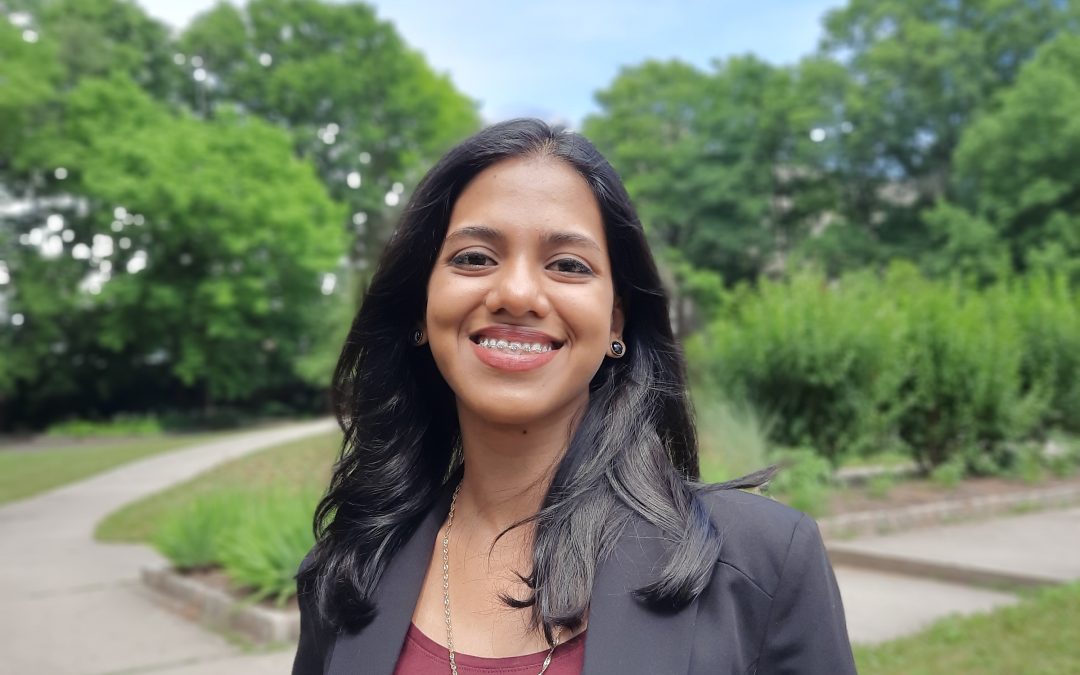
by Mohamed Elshekh | May 18, 2021 | Internship Experiences, Undergraduate Students
My name is Harshana Ghoorhoo, and I am a junior majoring in Diplomacy and International Relations, Modern Languages, and Philosophy. I am currently a research intern at the Modern War Institute (MWI) at West Point Academy. MWI is a national resource within the Department of Military Instruction that provides a unique platform to conduct studies on recent and ongoing conflicts to help military leaders navigate today’s complex world. MWI’s projects include activities such as scholarship, multi-disciplinary battlefield assessments, symposia, among others.
Given my interest in studying military strategy, urban warfare, and military classical thought, the internship has been key in fostering the necessary skills and knowledge that will prepare me for a career in military studies. So far, I have assisted with the publication of MWI-affiliated scholarship through research, formatting, editing, and fact-checking, which has given me a better understanding of the process behind producing publishable reports and articles. Currently, I am working directly under the director of research and the chair of the urban war studies department. I am involved with two major projects researching U.S. military history and military strategy of former U.S. presidents during the Revolutionary War. Additionally, I am writing a series of urban battle reports for MWI’s Department of Urban War Studies.
The support I have received from my supervisors is incredible. They have been very friendly, responsive, and have encouraged me to take up projects that capture my interest. Working with them makes me enjoy completing my internship hours and pushes me to continue contributing to the research projects currently underway at MWI. Even though my internship is remote this semester, I am fortunate to be working in an environment that remains highly productive despite the restrictions imposed by COVID-19. My weekly calls with my supervisor always start with a small recap of our respective week, sharing ideas, talking about interesting news, academic updates, and so on. He has been more than a supervisor; he has been a valuable mentor.
Working at MWI has given me important insight into how think tanks and research institutes function and how to succeed in the sphere of research and academia. My involvement with Seton Hall’s student organizations has been instrumental because they have provided me with vital skills that I am actively using in my current role as a research intern. My role as an editor for the Diplomatic Envoy has proved consequential since I write urban battle reports and occasionally copy-edit articles submitted to the MWI. As a research assistant at the DiploLab, I have learned essential skills in conducting research that I regularly translate to my work at MWI.
My internship rarely feels like I carry a workload. On more than one occasion, I have opted to write a battle report or start a new project in my spare time because of the excitement and passion I have for the work. Of course, having supportive supervisors has been key in enabling these sentiments. I would highly recommend MWI to anyone looking for an internship that strengthens your writing skills, expands your academic horizons, and pushes you to become a more effective researcher.
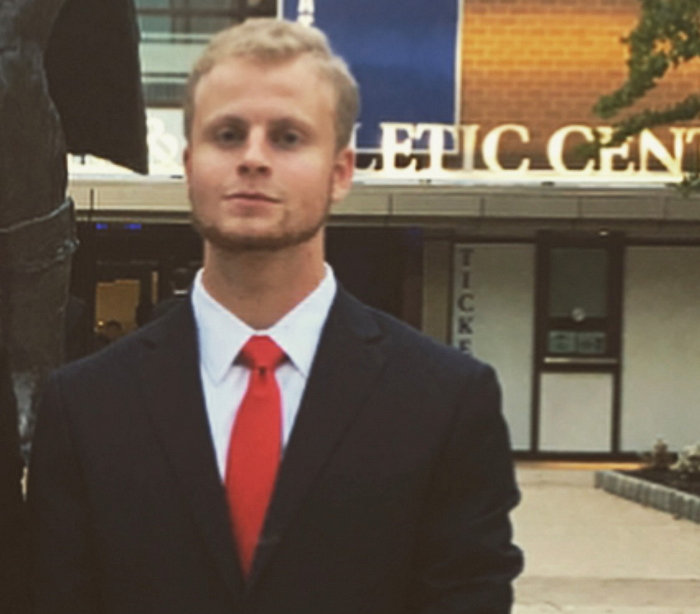
by Mohamed Elshekh | Apr 9, 2021 | Internship Experiences, Undergraduate Students
My name is Lawson Barkley, and I am a senior at Seton Hall University majoring in Diplomacy and International Relations with minors in Economics and Russian. I am currently interning with a District Court Judge in North Carolina as a research intern, and my time so far has been invaluable. I previously spent time with the judge and have come to admire his character and work ethic. His ability to foster a safe and friendly work environment, while at the same time challenging me with assignments, makes this internship very enjoyable.
As is the case with internships amidst the Covid-19 pandemic, I work remotely and spend my free time and weekends on internship assignments. This internship is incredibly flexible; therefore, I can balance my homework and internship assignments throughout the week. When it comes to my work with the District Court, my experience as a Diplomacy student aided me in the completion of all tasks. Particularly, courses like Public International Law (PIL) have prepared me for this role. Like the work I do at my internship, PIL assignments consist of reading case law and preparing case briefs that interpreted laws. This was one of the primary tasks I had to complete for my supervisor. Working on case briefs became difficult when dealing with laws that were new and had no concrete precedent from which we could derive rulings. However, once I had a strong understanding of these laws, I could sift through cases and determine where they were used, and how they were used. This is important work since judges have the power to use discretion when interpreting laws on cases.
One of the best skills I gained during my internship is the ability to effectively write case briefs. When I first started the internship, I would spend quite a bit of time on one case; however, I quickly learned that I should not read through every little detail. Now, I am better at finding where the main points of cases are, and whether to continue reading it word by word. This skill will not only help me effectively deal with case law but can be transferred to any readings that I do for my other courses.
I strongly recommend interning with a judge or lawyer for anyone interested in the field of legal studies. As a result of the pandemic, naturally, the internship was a unique experience. Internships during Covid-19 are more research-focused. In the past, I toured the courthouse and saw the inner workings of a District Court. Not only did I experience the legal field from the perspective of a judge, but I also experienced it from the perspective of a lawyer. I networked with many lawyers who have guided me concerning my place within the legal field. Overall, this internship prepared me for my future law school journey. The ability to research cases and write briefs is critical for students looking to pursue a JD. Although I did this internship remotely, I hope to connect with my supervisors and mentors in the future once the lockdown restrictions have eased.

by Mohamed Elshekh | Mar 16, 2021 | Internship Experiences, Undergraduate Students
My name is Sade Nixon. I am an undergraduate senior from Chicago, Illinois completing my degrees in Diplomacy and Modern Languages. I am currently studying Russian and French, both of which I make extensive use of since starting my internship with the United States Mission to the United Nations (USUN). I am currently interning with the Political Office of USUN, which handles US Foreign policy as it pertains to Security Council activities.
The interconnectivity of my field is hitting me full force and idea-mapping to trace ripple effects and possible overlap has been beneficial. Courses such as Institutions of Global Governance and international law courses have already proven their practicality on day one. I am grateful to be confronted with things outside my comfort zone; the necessary question-asking has given me opportunities to build rapports with my senior colleagues, who have been supportive in exposing me to topics I have a specific academic interest in.
Like most things I have done to the end of pursuing my goals, working at the US Mission constantly reaffirms my career aspirations. This has always been something I have wanted to take on; now I get to have my expectations exceeded. I now have my own projects to handle and have recently completed work on negotiations of several UN Mandate renewals and Resolution revisions. Other than that, my work is mainly research on geopolitical affairs and handling initiatives for Foreign Service Officers. These tasks have certainly sped up my processing time and forced me to work on balancing thoroughness with timeliness. It has also made my professional writing more uniform and streamlined.
My tasks are mainly informative and administrative (attending meetings, drafting documents for Washington, and research, mostly), and I answer to the Foreign Service Political Officers and to the Deputies. My co-workers at my level are graduate students in international affairs programs, and my superiors are Foreign Service Officers and Political Advisors. The FSO I am partnered with directly specializes in African affairs. I am full-time, so I am working from 9am to 6pm Monday through Friday. The environment is naturally quite energetic by virtue of our scope, especially as we have now entered the 4th quarter of the year, and the FSOs are incredibly supportive in making sure the interns are working on our areas of interest. Though the DOS internships are virtual this year, the speed with which the office has adapted to working mostly online and the level of availability they maintain even when we cannot always see one another in person has been truly impressive. Challenges are mainly related to timelines and the volume of work, but I love being kept busy and the pressure has made me accustomed to managing an extremely demanding schedule and delegating to others if need be.
Over the course of my internship, my professional goals have become clear: next semester, my aim is to prepare for the Foreign Service Exam and explore my options for Graduate Schooling to obtain my master’s degree. This is due to my work experience, but also thanks to the vested interest our Officers have taken in my goals for my career.
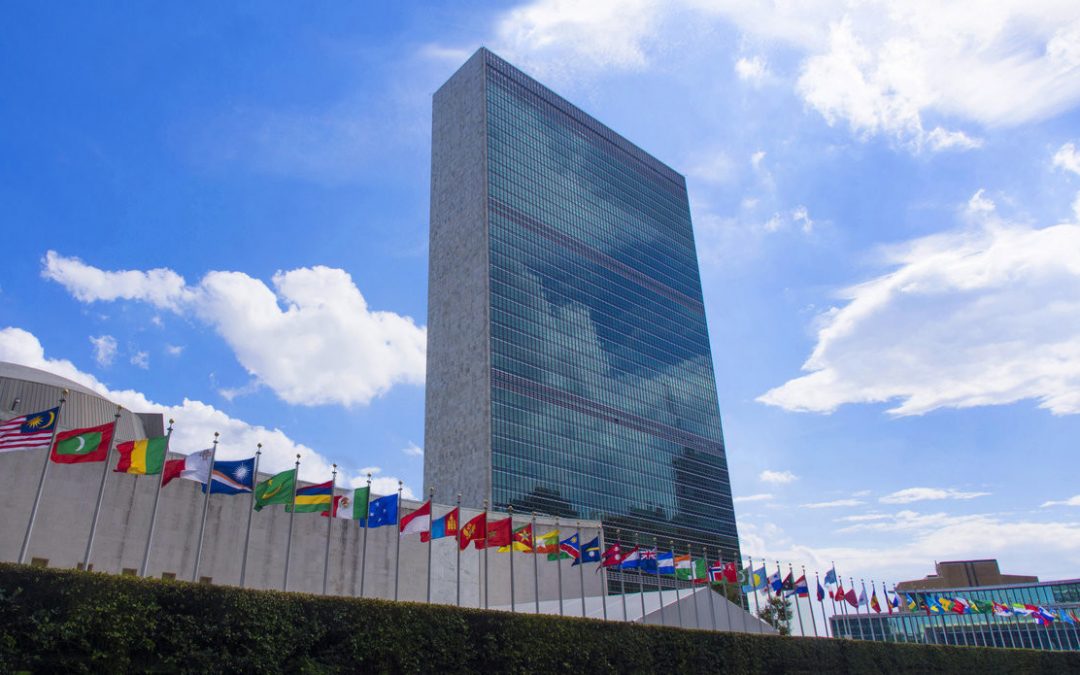
by Mohamed Elshekh | Jan 28, 2021 | Internship Experiences, Undergraduate Students
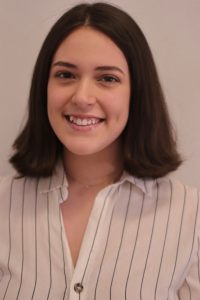 My name is Vanessa Vuji. I am currently a senior at Seton Hall University studying International Relations & Diplomacy and Modern Languages. I am working as an intern reporter for La Voce di New York, an Italian-English UN based journal. My internship has been an incredibly transformative experience – one that has shaped my academic and professional endeavors. Interning for the United Nations has always been a goal of mine, and with this internship, I am not only directly engaging with UN professionals, but I am also shaping my career path by taking on work that aligns with my interests. Being exposed to the world of political journalism has exposed me to an entirely different professional career path that I may consider in the future.
My name is Vanessa Vuji. I am currently a senior at Seton Hall University studying International Relations & Diplomacy and Modern Languages. I am working as an intern reporter for La Voce di New York, an Italian-English UN based journal. My internship has been an incredibly transformative experience – one that has shaped my academic and professional endeavors. Interning for the United Nations has always been a goal of mine, and with this internship, I am not only directly engaging with UN professionals, but I am also shaping my career path by taking on work that aligns with my interests. Being exposed to the world of political journalism has exposed me to an entirely different professional career path that I may consider in the future.
My interests in conflict resolution and international politics, coupled with my passion for journalism, prompted me to pursue an internship experience that combined all my academic interests. With the Journal, I am primarily tasked with attending press briefings and Security Council meetings. The notes that I take at these meetings allow me to write my articles, which I usually write in Italian, although I am also tasked with writing in English. These articles center on important issues taking place around the world, whether it be climate change, immigration, public health, domestic politics, or international conflict.
This internship gives me the ability to inform people on global events – events that often do not get enough coverage. For instance, one topic that I was able to research focused on the rejection of Syrian refugees from Greece. I am able to learn about international politics as well as the inner workings of the United Nations.
The research and writing that I conduct at my internship host site are skills that I learned through my coursework at Seton Hall. The skills that I learned from writing research papers and essays are directly transferable to my internship. These skills have been greatly improved since I began my internship as I am constantly researching, writing, and translating.
My Italian language skills have also greatly improved. When the internship started, I found it difficult to write articles in Italian. However, with the help of my supervisor, I strengthened my grammatical skills, particularly, my verb conjugations and translations.
The lessons I learned through this internship are numerous. Students interested in global affairs and political journalism will certainly benefit from interning with La Voce di New York. This internship is a great way to improve your writing, research, and language skills, and provides the opportunity to advocate on important issues taking place across the world.
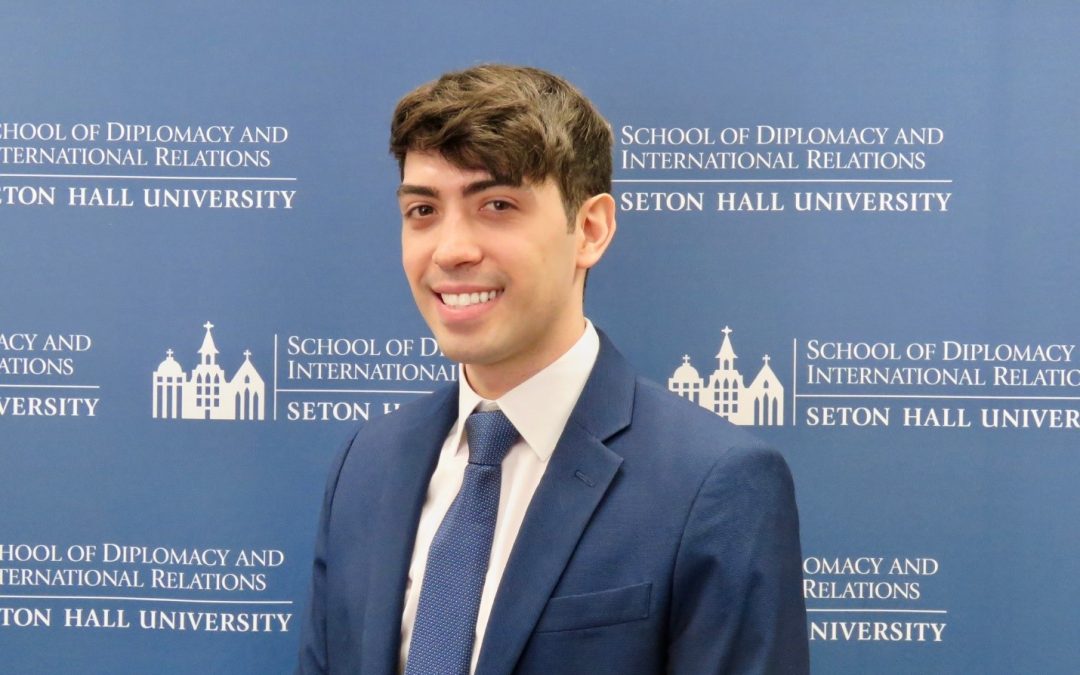
by Mohamed Elshekh | Nov 23, 2020 | Graduate Students, Internship Experiences
My name is Cristian Y. Ramos and I am in my last semester at the School of Diplomacy and International Relation’s M.A. program, specializing in International Organizations and International Law and Human Rights. I am very passionate about understanding human rights issues, particularly that of refugees and sexual violence against men and boys. My nine-month internship in the Humanitarian Office of the United Nations Population Fund (UNFPA) in New York helped me engage with my academic interests on a professional level. UNFPA is the sexual and reproductive health agency that deals with prevention and response in sexual gender-based violence (GBV), female genital mutilation (FGM), and other humanitarian priorities in 123 countries. During my time with UNFPA, I was a Policy and Liaison Intern for the humanitarian team. My duties ranged from taking notes during meetings to researching and helping the team develop innovative projects.
Some of my most meaningful projects involved doing research on sexual violence against men and boys in conflict settings and on the UN Framework on Mental Health and Psychosocial Support (MHPSS). Both projects highlighted of the need for more diverse and integrated systems to treat those suffering from mental health due to violence, human rights abuses, migration, displacement, and more recently, the effects of Covid-19. The systems that are in place to serve and treat people require that services are given to men, women, girls, boys, and the elderly without discrimination or preference. Additionally, my internship provided me with the opportunity to see diplomacy in action. During meetings with delegates and ambassadors, I experienced how my supervisors diplomatically negotiated on behalf of the agency when funds were needed to implement programs and projects at the country level.
My coursework at Seton Hall was critical to my success with UNFPA. In particular, my classes in International Human Rights and Public International Law helped me build a foundation in the discipline and understand how international organizations, like UNFPA, help advance human rights and how they can improve. My internship was incredibly transformative as it helped me acquire skills in research, diplomacy, and writing. Working at the United Nations provided me with a different set of professional skills that vary from the skills I learned in the classroom. The reports that I put together with UNFPA had to abide by a particular template, as per UN guidelines, and they needed to be written in a different style. Additionally, I learned how to conduct negotiations by observing my supervisors as well as the ambassadors and diplomats who worked with our team.
I would definitely recommend this internship to those seeking a professional environment that deals with human rights issues. UNFPA is an organization that puts theory into practice. Students will not only learn about the important issues facing the global community but will also learn the codes of conduct and culture of the United Nations.









